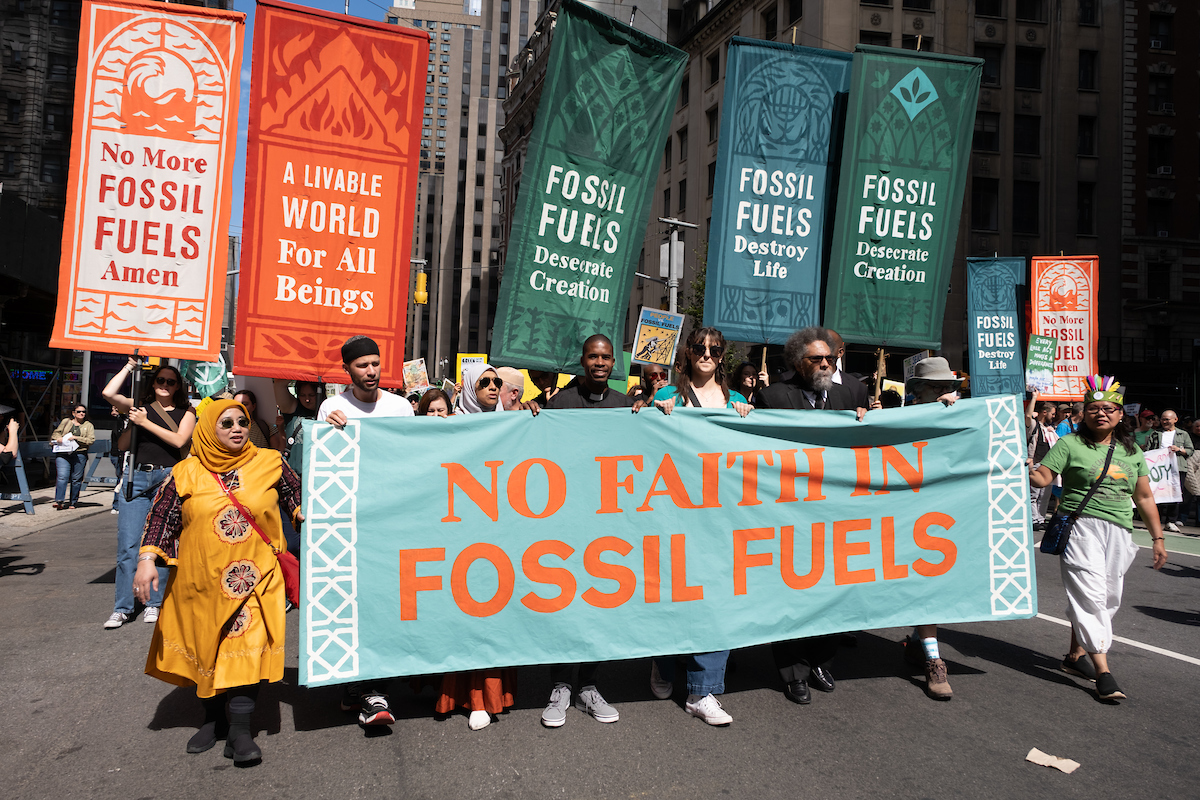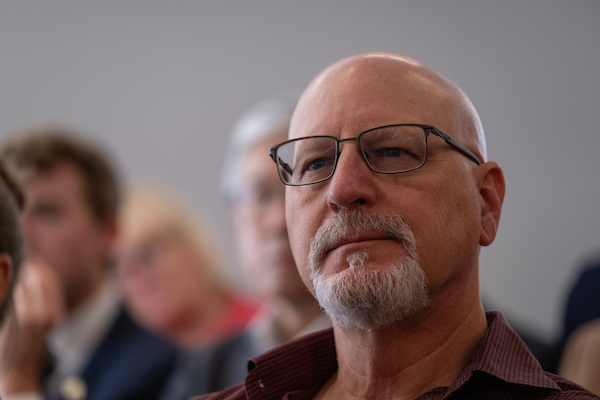
By Rev. Fred Milligan
This year’s mid-September United Nations General Assembly (UNGA) high level opening week featured two events that allowed the world to reflect on the progress made since the adoption in 2015 of the 17 Sustainable Development Goals (SDGs) and the Paris Climate Agreement.
The first event was the SDG Summit of September 18-19, intended to renew the commitment of the world’s nations to press forward toward the goals they had adopted eight years ago.
The second event was the Climate Ambition Summit of September 20, called by UN Secretary-General Antonio Guterres to accelerate progress toward the goals of the Paris Agreement. This is linked to SDG 13 which urges the world to “Take urgent action to combat climate change and its impacts.”
SDGs and Climate Justice
The linkage of the two events is particularly significant from the perspective of Climate Justice. The other sixteen SDGs address crises such as child mortality, gender discrimination and many other dimensions of human and non-human life. All the goals are complexly linked as parts of the solution to the climate crisis and vice versa. The solution to the climate crisis must include climate justice. As a student of cross-cultural theological ethics, I can attest that the 17 SDGs are congruent with visions for life on the planet which the world’s religions have long held.
Many feel it will not be possible for the global community to make the kinds of changes necessary to fight global warming and achieve climate justice without the full engagement of all our cultural resources, including those of the religious community. But, according to some observers, the religious community has not been fully engaged in the UN SDG process, particularly SDG 13 on climate change.
It was with this concern that I participated as an observer in various activities surrounding the UN high level week. With a growing sense of urgency, I listened to reports that there has been very little progress on any of the SDGs, including climate, since their adoption. In some cases, there has actually been retrenchment.
UNGA-related events
The first event was disappointing from my perspective. On Saturday, September 16th, I attended UN Mobilization Day events with Alison Kelly, ACT’s Representative to the UN. This included a forum on civil society inclusion and another on the role of youth and young adults in the SDG processes.
I listened with great anticipation to Secretary-General Guterres’s remarks. I hoped he would include an acknowledgement of the important role of the faith community in achieving the SDGs, but alas, there was none. In fact, of all the interventions, only the moderator of one panel mentioned faith. She said that she represented many identities, including activist, young adult, person of color, woman and believer. While this acknowledgement of the spiritual dimension of human culture and identity was welcome, I was, to say the least, disappointed by its exceptional rarity.
The next days, however, offered a more encouraging picture:
- September 17: The ACT Alliance team participated in the March to End Fossil Fuels with representatives from the World Council of Churches and hundreds of others in the faith section. Tens of thousands of marchers focused on US climate policies and practices and the global climate crisis.
- September 18: I attended Inspiring, Faith, Hope and Transformative Action to Accelerate progress Towards the SDGs, a high-level forum sponsored by the Trilateral Partnership of Regional Faith-Based Networks for the SDGs. The group represented Africa, Asia-Pacific, Latin America and the Caribbean and was led in part by ACT Alliance’s Asia-Pacific Regional Representative Alwynn Javier.
My initial concerns about a disconnect between the UN’s SDG process and the faith community were confirmed when a panelist who had been part of drafting the original SDGs spoke of her disappointment that there had originally been no vision in those founding documents for how to constructively engage the faith community.
Still, the presence on one of the panels of a high-level UN official gave me hope. Perhaps if we push the UN at a local level and do not receive the kind of collaboration we would hope for, we might still have assistance from those higher up the chain of command. I was also intrigued by the presence of Ambassador Hussein, a US State Department employee who focuses on interreligious cooperation.
- Wednesday, September 20: The Episcopal Denominational Stocktake presented a model for how faith communities could evaluate their own efforts and ambition on climate.
- Thursday, September 21: I attended the Kofi Annan Briefing sponsored by ACT Alliance and the Multi-faith Advisory Council to the UN Interagency Taskforce on Religion and Sustainable Development. Panelists spoke on the faith community’s role in effective implementation of SDG initiatives in countries where local knowledge and trust is essential for effective outreach. Yet some concern was expressed that the relationship between the UN and faith communities be that of co-creators instead of simply implementers of solutions to social and environmental ills.
- ACT Climate Justice Reference Group co-chair Mattias Soderberg of DanChurchAid organized a high-level meeting on Adaptation Finance. Sponsored by Denmark and Bangladesh, it included key decision-makers who will be at COP 28 and a member of the COP presidency.
Climate and US faith groups
In the weeks following the UNGA high-level week, two publications offered further food for thought that were important from my perspective as a US citizen.
October 4: Pope Francis released his second encyclical on climate change Laudate Deum (Glory to God). In this, his second pastoral letter on the climate crisis, the Pope says forcefully that while scientists have done their work faithfully in addressing our minds, the religious community has yet to effectively address the hearts of people. He singled out the citizens of the US for rebuke, saying that their per capita carbon footprint is twice that of Chinese citizens. While this reader would have appreciated more diligent sourcing of such statements in the document, the point is assumed to be a valid one, at least in historical cumulative terms.
October 6: According to Kristoffer Tigue in Inside Climate News two recent studies shed light on the views of Americans in relation to the climate crisis.
“A Pew Research Center survey, found that just 44 percent of American Catholics believe in human-caused climate change,” he writes. “While 29 percent believe the warming climate is due to “natural patterns” and 13 percent don’t believe Earth is warming at all.”
He further notes that “A second survey, by the Public Religion Research Institute found that ‘the higher someone values their religious beliefs, the less likely they are to believe that Earth is warming” due to human activity’.”
Ways forward
The foregoing leads me to four conclusions:
- Many of the world’s religious leaders now realize that we can and should engage as a force to achieve sustainable development, climate change and climate justice goals.
- While many in the UN hierarchy seem ambivalent about the value of collaborating with faith-based groups, (no doubt for very good reasons in many situations), there also seems to be a growing openness to dialogue on how each sector’s strengths can complement the other. However, there is still much work to be done to ensure the inclusion of religious leaders and faith actors across the work of the UN.
- We on the faiths side have much work to do to convince people within our churches that the SDGs and Climate Justice goals align with the deepest yearnings and demands of our traditions.
- Finally, we in the faith community must encourage our leaders to keep reaching out across boundaries and engage with members of the UN to forge bonds of trust and collaboration.

Rev. Fred Milligan is an Act Alliance Global Climate Justice Advocacy Team member and local New York City volunteer for UNGA Week, September 17-22.